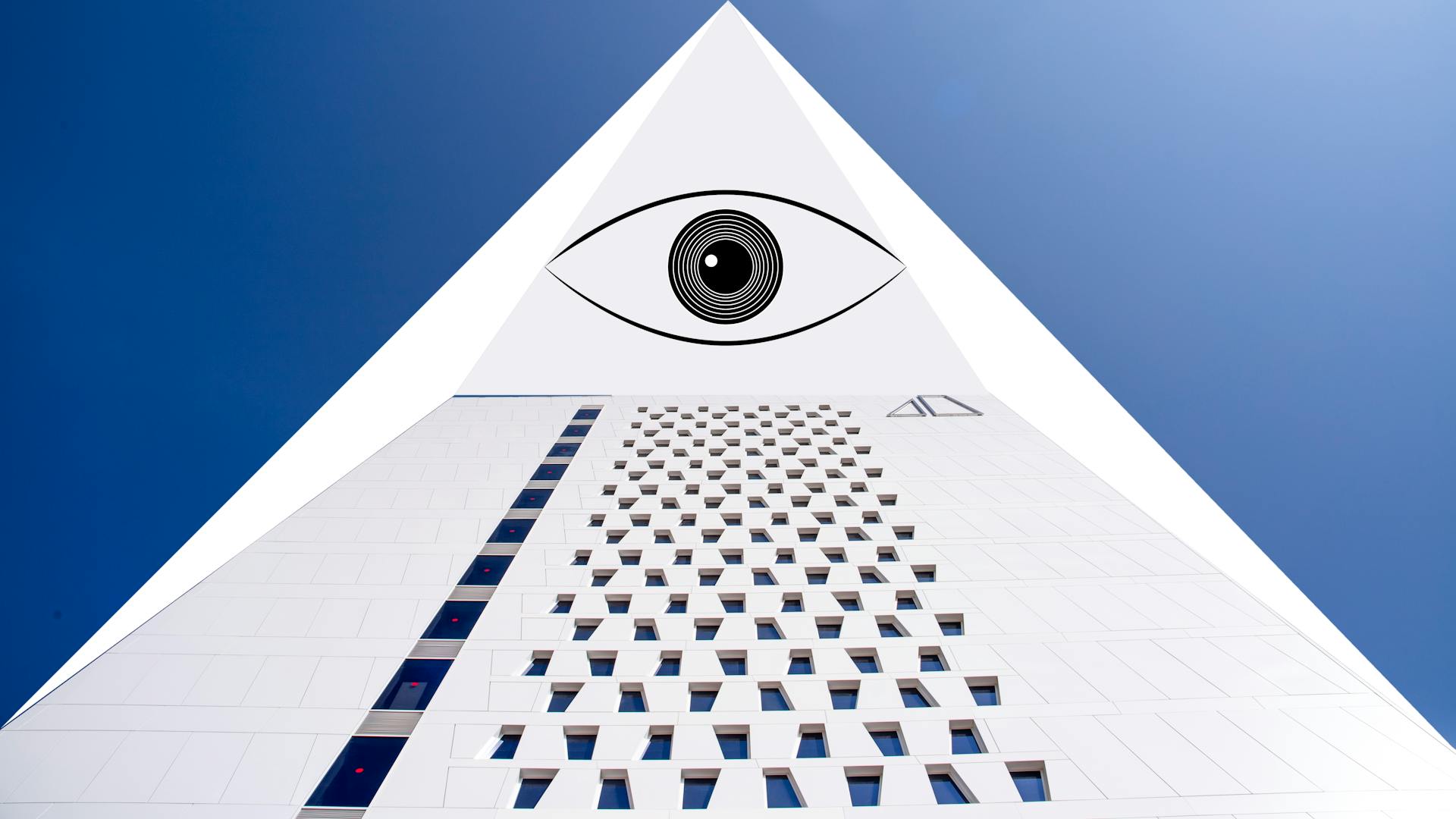
Living with a one-eyed Shih Tzu requires some special care and attention. A one-eyed Shih Tzu's life expectancy is similar to that of a two-eyed Shih Tzu, around 10 to 16 years.
Their vision may be impaired, but with some adjustments, they can still navigate their surroundings easily. One-eyed Shih Tzus can adapt to their environment and learn to compensate for their limited vision.
Their eye socket will take time to heal, but with proper care, it can be a non-issue. In fact, many one-eyed Shih Tzus live happy, healthy lives with minimal complications.
Intriguing read: Cross Eyed Shih Tzu
Eye Problems in Shih Tzus
Eye problems are a common issue in Shih Tzus, and it's essential to be aware of the potential risks. Some breeds, including Shih Tzus, are more prone to developing cherry eye, a condition where the gland of the third eyelid prolapses, causing a red mass to appear in the corner of the eye.
Cherry eye is usually not painful, but it can lead to dry eye and potentially cause vision problems. It's common in small dogs, especially young ones, and breeds with short muzzles like Shih Tzus are more likely to develop this condition.
Symptoms of cherry eye include a noticeable circular mass protruding from the side of the eye, which can be accompanied by swelling and irritation. Since the condition is likely inherited, it's essential to be aware of the breed lines and potential risks.
If left untreated, cherry eye can lead to dry eye, which can cause vision problems and potentially blindness. Treatment options include medical interventions, such as eye drops, and surgery to suture or remove the gland.
Retinal detachment is another potential eye problem that can affect Shih Tzus. It's diagnosed through a series of tests, including blood work, infectious disease testing, and blood pressure checks.
Treatment for retinal detachment depends on the underlying cause, but surgery is often necessary to repair the detachment. In some cases, medication may be used to resolve the underlying medical condition, such as an eye infection or inflammation.
Cataracts are a common eye problem in older dogs, including Shih Tzus. They're caused by an opaque cloudiness in the eye lens, which can lead to vision impairment or blindness.
Take a look at this: Alapaha Blue Blood Bulldog Breed
Cataracts can be removed surgically, but it's essential to diagnose the condition early to prevent vision loss. Distichiasis, a condition where an extra row of eyelashes develops along the edge of the eyelids, can also cause eye problems in Shih Tzus.
Distichiasis can lead to corneal ulcers, pustules, and excessive tearing, and it's essential to identify the condition early to prevent further complications.
Here's a summary of common eye problems in Shih Tzus:
- Cherry eye: a condition where the gland of the third eyelid prolapses, causing a red mass to appear in the corner of the eye.
- Retinal detachment: a condition where the retina separates from the back of the eye, potentially leading to vision loss.
- Cataracts: an opaque cloudiness in the eye lens, leading to vision impairment or blindness.
- Distichiasis: a condition where an extra row of eyelashes develops along the edge of the eyelids, leading to corneal ulcers and other eye problems.
It's essential to be aware of these potential eye problems and take steps to prevent them, such as regular eye exams and a balanced diet.
Causes and Diagnosis
Shih tzus can be prone to having birth defects of their eyelids or eyelashes, which can lead to blindness in the affected eye. This is often apparent when the puppy is still young.
Shih tzus are also more prone to eye injuries due to their large eyes, even if the injuries are not immediately visible.
Hereditary ocular conditions can cause retinal detachment in shih tzus of any age, leading to blindness.
Retinal detachment can be caused by a variety of factors, including face or eye injuries, diabetes, tumors, viral or bacterial infections, kidney disease, hypertension, hyperadrenocorticism, poor blood clotting, toxin exposure, cataracts or cataract surgery, and genetics.
Diagnosing a retinal detachment in a shih tzu can be challenging, and your primary care veterinarian may refer you to a veterinary ophthalmologist for a specialized evaluation.
The following diagnostic tests may be recommended to identify the underlying cause of retinal detachment:
- Blood work to evaluate kidney, liver, and pancreatic function, and measure blood sugar and electrolyte levels.
- Infectious disease testing to identify certain bacterial and viral pathogens that can cause ocular issues.
- Blood pressure testing to ensure the pet's blood pressure is within a normal range.
Treatment and Prognosis
Most retinal detachments in shih tzus can be successfully treated, depending on the cause, but congenital detachments and detachments associated with retinal degeneration cannot.
Prompt diagnosis and treatment is essential for a good prognosis, so monitor your shih tzu closely to ensure their eyes remain healthy.
Shih Tzu puppies born with lazy eyes generally adjust to their eye position and do not need surgery or medication.
Shih Tzu puppies with lazy eye due to hypoglycaemia can often live long lives with management and check ups.
If your shih tzu suffers from a retinal detachment, many methods can be used to repair retinal holes and detachments, including laser retinopexy, titanium tacking, expandable gasses, vitrectomy, silicone oil, scleral buckling, and cryoretinopexy.
Here are some common treatment methods for retinal detachments in shih tzus:
- Laser retinopexy
- Titanium tacking
- Expandable gasses
- Vitrectomy
- Silicone oil
- Scleral buckling
- Cryoretinopexy
Retinal Detachment in Tzus Treatment
Retinal detachment in Shih Tzus can be treated successfully, depending on the cause. Prompt diagnosis and treatment are essential for a good prognosis.
Most retinal detachments in Shih Tzus can be treated surgically, but congenital detachments and those associated with retinal degeneration cannot. Various methods, including laser retinopexy, titanium tacking, expandable gasses, vitrectomy, silicone oil, scleral buckling, and cryoretinopexy, can be used to repair retinal holes and detachments.
Medication may also be necessary to resolve the underlying medical condition. For example, systemic antibiotics may be used to treat an eye infection, while oral anti-inflammatory medications can help with inflammation.

Monitoring your Shih Tzu's eyes closely is crucial to ensure their health. If you notice any eye abnormalities or problems, contact a veterinary ophthalmologist right away.
Here are some common treatments for retinal detachment in Shih Tzus:
Fluid removal from behind the retina may require a diuretic, and topical medications may be necessary if the front portion of the eye is infected or inflamed.
Prognosis
When a Shih Tzu puppy is born with a lazy eye, it's likely to adjust to its eye position on its own without needing surgery or medication.
Shih Tzu puppies with lazy eye due to hypoglycaemia can often live long lives with proper management and regular check-ups.
The prognosis for a Shih Tzu puppy that develops a lazy eye due to a birth defect of the eyelid is that it will need corrective surgery.
There are different types of Progressive Retinal Atrophy (PRA), and the Shih Tzu breed is more likely to be affected by the late onset type.

The retina of a Shih Tzu puppy affected by PRA will mature and function normally for an unpredictable amount of time before degenerating.
Symptoms of PRA in Shih Tzus typically start out as night blindness, often between 2 and 5 years of age, and can progress to peripheral vision loss and eventually blindness.
The good news is that there are tests that can be done on breeding stock to certify and register them as being free of PRA, which means they're considered at low risk for carrying and transmitting the gene.
Frequently Asked Questions
Why are my Shih Tzus eyes not straight?
Uneven muscle development can cause one or both eyes to veer off-center, resulting in crossed or misaligned eyes. This condition can affect one or both eyes, and is more noticeable in pets with prominent facial features
Why is my Shih Tzu suddenly blind?
Sudden blindness in your Shih Tzu may be caused by a detached retina, which can occur without warning. If your dog is experiencing sudden blindness, seek veterinary attention immediately to determine the underlying cause
Sources
Featured Images: pexels.com


